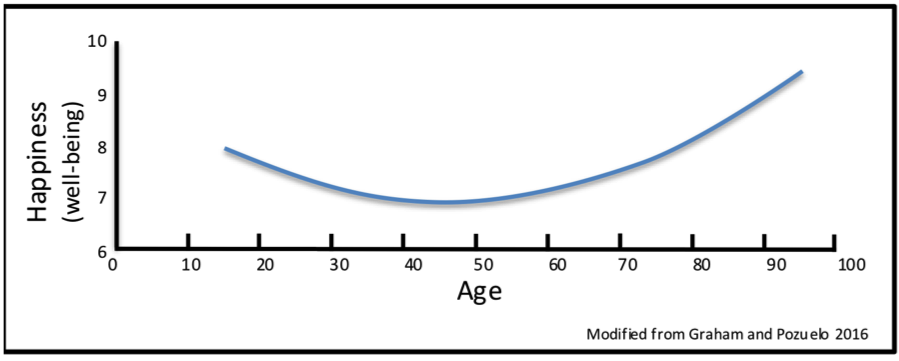 The myth that is the midlife crisis may be mortally wounded by current research. However there’s ample evidence of a midlife dip that’s more than just a pothole in the road of life.
The myth that is the midlife crisis may be mortally wounded by current research. However there’s ample evidence of a midlife dip that’s more than just a pothole in the road of life.
In my last post I explored the origin myth of the midlife crisis. Research suggests that a midlife crisis may be far less likely to occur than originally thought. In fact, only about 10 percent of men actually experience a full-blown midlife crisis. The midlife crisis may be on the mat, but research has also confirmed a slump in well-being at midlife.
The (nearly) universal U-shaped curve of happiness
A growing body of research over the past decade has confirmed that our sense of well-being through life forms a U-shaped curve. As men in our 20s and early 30s we focus on external achievement and goals (that successful career, the perfect family, the castle on the hill). In our 30s and 40s we start to get tangled up in the stresses and trials of the real world and the challenges of achieving the goals we set early in life. Perhaps because of this, or other factors, our happiness quotient in the first half of life trends downward, bottoming out in our mid 40s. But then in our mid 50s we begin a slow ascent and happiness (or our sense of well-being) increases again … thankfully!

This general finding is so striking because it has been consistently found across many countries and cultures (and even in other primates!). While definitely not found in all countries and generations, in a recent study of 46 countries, 44 had a clearly defined U-shape when well-being was compared across age.
The lowest point of the curve differed between countries, but was generally between 40 and 60 years. The low-point for folks in the U.S. was found at about 46 years of age. A 2010 study found similar results, with well-being of U.S. males bottoming out in their early 50s.
So midlife is, statistically speaking, the rock-bottom of our happiness in life? Now there’s something to celebrate … no wonder I’m so depressed …
Reframing the midlife story
This midlife dip may be what’s been generalized through the myth of the midlife crisis, and could explain how the crisis myth has such a strong hold in our culture. Most of us can expect to bottom out somewhere and in our own unique way in midlife, but few of us will have a full-blown crisis.
This reframe of the midlife experience provides some measure of comfort in that:
1. we’re not alone
2. midlife doesn’t have to be cataclysmic
3. there’s the hopefulness of an upswing somewhere in our 50s
Right, how lovely that we have a new la-ti-da story, but I want resolution! Just give me answers on how to avoid it or minimize it would you, or at least a pill to help ease the pain!
Unfortunately there’s no silver bullet here. There are also potential challenges in medicating our way through midlife. Unfortunately there’s still no clear explanation of why our sense of well-being bottoms out in midlife and then rises throughout the rest of late adulthood. But where there’s a will, there’s a way, and we don’t have to reinvent the wheel. We just have to look to the survivors.
Following in the footsteps of the survivors – the climb up from midlife
So at this point you may be asking yourself, what do folks in their 60s and 70s have that those in the trough of midlife might be lacking? (I thought we weren’t supposed to trust anyone over 30 …)
In my next post I’ll dig into a few current ideas and observations that shed light on what might account for the bounce back in midlife. The focus is on the qualities and actions associated with people in later life, such as:
- Creating a life of meaning (building and sustaining a sense of fulfillment or purpose)
- Knowing ourselves and becoming what we are (understanding our deeply held values and living them)
- Greater emotional intelligence (creating connection and communication by employing loyalty strategies vs exit strategies)
- Reduction in perceived severity of stressors (drama management)
- Increased capacity to self-regulate emotions (less likely to resort to anger or respond to anger with anger)
- Ability to see situations positively (less likely to see other’s responses as negative or remember them as negative)
- The perspective of time (that heals everything, right?!)
- Reduced regret response (not mulling over or focusing on what’s beyond our control)
- Increased wisdom (or more specifically the traits that come with it like compassion, empathy, respect for and tolerance of divergent beliefs, acceptance of ambiguity, ability to make decisions based on the good of the whole, levelheadedness)
I hope this post has provided some new insight on your midlife experience. I’ll look forward to see you again soon at the corner of Midlife and Thriving!
Successfully managing midlife? Which of the above strategies do you use to successfully navigate midlife challenges?  I’d love to hear from you in the comments below!


Recent Comments